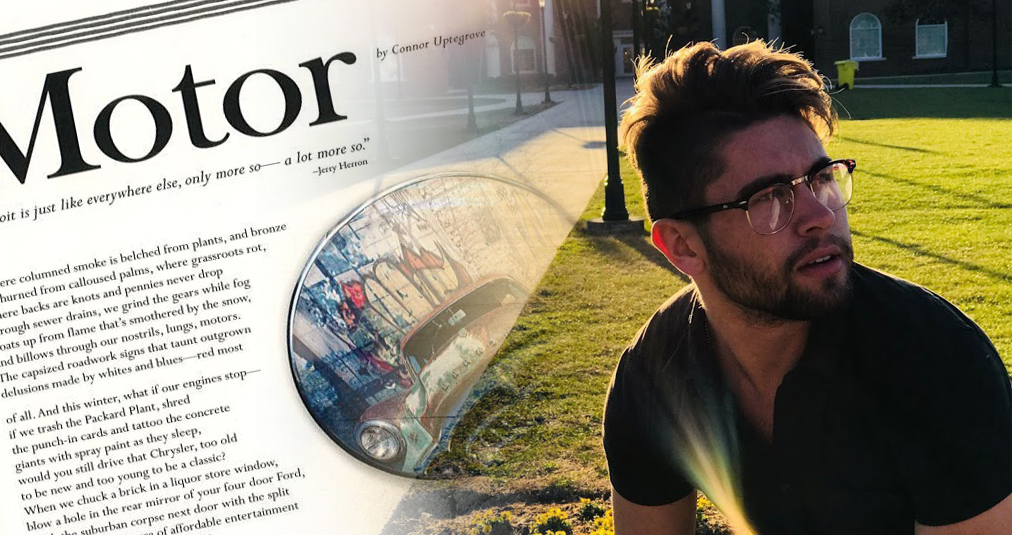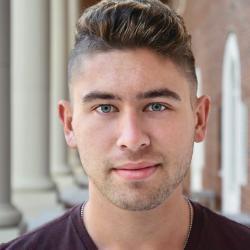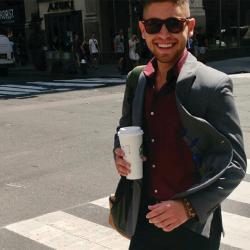
SNAPSHOT | NOVEMBER 20, 2020

Dream job? Check.
Connor Uptegrove (’19) is “over the moon.” Despite cataclysmic odds, he has landed a full-time gig in his chosen field. At a nonprofit organization. In a pandemic. Who does that?
A Chanticleer with talent, background experience, and determination. These qualities cinched Uptegrove’s new position as communications coordinator at the Children’s Center for the Visually Impaired in Kansas City, Mo., starting Dec. 1, 2020.
 Armed with a degree in communication and a minor in creative writing as well as years of experience writing for CCU’s Office of University Communication and the Edwards alumni magazine, Tapestry, Uptegrove hit the job market running in his home city. After finding short-term contract work in his field, followed by a near-miss at full-time work due to a COVID-related hiring freeze, Uptegrove bided his time with a marketing position for a property management company. He jumped at the news, provided through a friend, of this newly created communications coordinator position. A few weeks later, after an application process that featured Uptegrove’s portfolio – chock-full of writing produced at CCU – he landed the position.
Armed with a degree in communication and a minor in creative writing as well as years of experience writing for CCU’s Office of University Communication and the Edwards alumni magazine, Tapestry, Uptegrove hit the job market running in his home city. After finding short-term contract work in his field, followed by a near-miss at full-time work due to a COVID-related hiring freeze, Uptegrove bided his time with a marketing position for a property management company. He jumped at the news, provided through a friend, of this newly created communications coordinator position. A few weeks later, after an application process that featured Uptegrove’s portfolio – chock-full of writing produced at CCU – he landed the position.
“Working with kids is something that’s been very close to my heart,” Uptegrove said. “I thought, ‘Man, this is a nonprofit hiring right now, that’s in my field, that supports a cause I’m passionate about. This is definitely a place I could see myself.”
The role requires an ability to produce consistent, cohesive materials that convey a brand message for use among the development team, donors, and the public – an ability Uptegrove developed through his writing positions at CCU blended with his curriculum of public relations and creative writing courses.
“When I was at Coastal, a lot of what I did was creative writing, but if you narrow it down, it was that line between creative nonfiction and media relations-type writing – how you can blend the two and make it professional but also creative and engaging at the same time.”
“When I was at Coastal, a lot of what I did was creative writing, but if you narrow it down, it was that line between creative nonfiction and media relations-type writing – how you can blend the two and make it professional but also creative and engaging at the same time,” said Uptegrove. “That was very appealing to [the hiring team], and I learned it at Coastal.”
The ability to tell a story with the audience perspective in mind is another highly desired trait.
“Coastal was a gold mine for having to speak to biology majors and artists and business majors and sort of translate their language into a story and make sure it’s clear to your average reader,” said Uptegrove. “I’m going to be working with occupational therapists and teachers who use specialized terminology that a donor might not necessarily be familiar with, but should care about.”
Uptegrove also mentioned the importance of empathy in his writing approach, a quality he learned through creative writing, particularly classes with Colin Burch,  senior lecturer in the Department of English.
senior lecturer in the Department of English.
“Burch would say, ‘Truth is stranger than fiction,’ which isn’t a new phrase, but for me it opened the floodgates for storytelling professionally, and it relates profoundly to the stories I’ve written in my career so far,” Uptegrove said. “When you hear stories of kids who are learning things at the age of six, trying to get familiar with their world without the use of one of their senses, that is a life-changing, earth-shattering experience for them, for their parents, and for me, who can be on the other side of that pen and experiencing it too,” said Uptegrove. “I’ve learned to appreciate those moments, and to treat them with respect and grace whenever I go to write about them.”
Burch recalls Uptegrove’s talent and quick absorption of writing principles.
“He just had the knack from the get go,” said Burch. “Some students are already moving along when you get them, and he was definitely moving along when he came to my class. He did a very good job, especially in his creative nonfiction, of combining factual information and emotional relevance.”
Uptegrove urges CCU students to cast their academic net widely, regardless of specific plans for their future career.
“Even if you know what you want to do, still do things that are outside of your comfort zone.”
“Even if you know what you want to do, still do things that are outside of your comfort zone,” said Uptegrove. “For me, with creative writing, that was not in my wheelhouse before I got to Coastal, and now it’s cemented where I am in my career. I don’t think I took a class at Coastal that doesn’t in some way translate to what I’m doing professionally now.”
While his new position is ideal at this moment, Uptegrove is still looking up the ladder.
“You really feel like you made it when what you want to be doing in a year is exactly what you’re doing right now,” said Uptegrove. “It’s truly a blessing, but an opportunity too. It’s really exciting to think that this position may be a foundation for a job five, ten years down the road. This is the best thing that’s happened so far in my career, but I still think the best is yet to come.”





